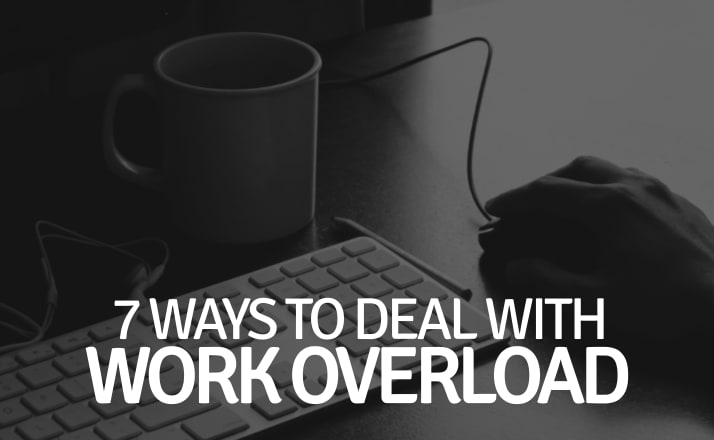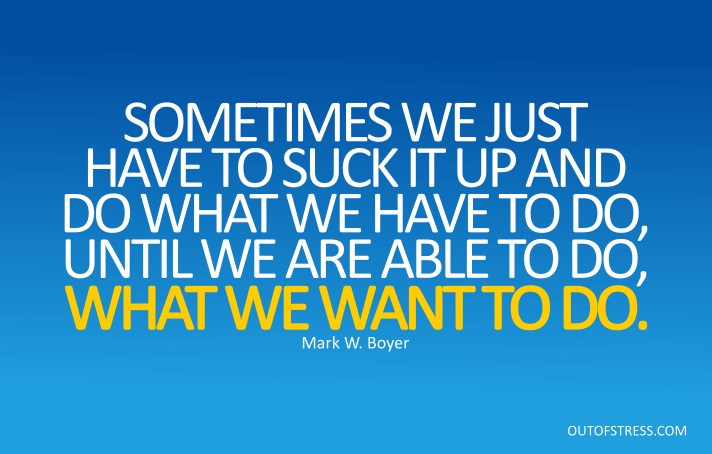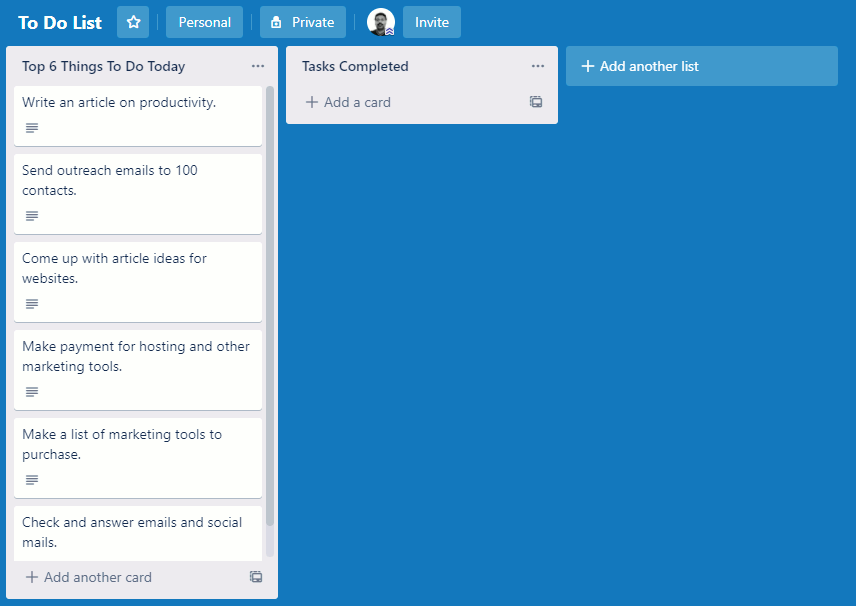
It’s common to hear the word “stress” in today’s work culture. The constant blaze of the computer monitor, non-stop phone calls, uncalled for meetings, unrealistic deadlines, the rush hour traffic – all these and more add to our daily woes increasing our stress levels and with it our mind’s ability to keep track of things as work starts piling up.
Eventually you start feeling the work load and the resultant issues – confusion, headaches, physical discomforts, depression and the accompanying diseases.
Let us take a closer look at why you feel overloaded with work and what you can do to eliminate it and get back in control.
Work overload – The underlying reasons
If you are in a situation where you feel overwhelmed by the “accumulated” work, then it’s safe to assume that you are not paying attention to an underlying problem and are trying to fix the symptom rather than the cause.
Here are some of the underlying issues that can cause work overload:
- You are spending less time “strategizing” and spending more time working without a proper structure.
- You are not delegating work properly.
- You are not focused enough and easily give into distractions.
- You find it difficult to say “No” to people who are pushing more work towards you.
- You are in the wrong field of work and your lack of interest causes you to work slowly (which results in work piling up).
- You find it difficult to balance or juggle between work and family life.
- You are a perfectionist.
- You are trying to do too many things too quickly.
It’s important to realize that work is not the basis of life but a part of it. If you are placing too much emphasis on your work, to the point where you derive your self of identity from the work you do, it’s natural for you to be bound up in it.
People who are free of work stress are the ones who have achieved a balance in their life where they understand their limitations, their strengths and their interests in a manner which helps them in regulating their work flow.
9 effective ways to deal with work overload
In the end it boils down to you wanting to live a better life. You must understand that without your commitment towards wanting a smoother and more relaxed life you cannot really achieve freedom from stress.
Based on this, here are 9 tips to help you effectively deal with work overload that I personally found extremely useful.
1. Spend a few hours strategizing before you start working

“Give me six hours to chop down a tree and I will spend the first four sharpening the axe.” – Abraham Lincoln
You will be amazed at how much redundancy is involved in most of the work we do.
So if you take the time to strategize and work out plans to simplify your work, you can cut back on several hours of mindless drudgery. When you work with a plan, you always work smart.
A simple way to start planning is to create lists where you jot down the things that you intent to complete in a day. This can include work related items as well as personal commitments.
If you are already using lists but find it ineffective, consider using the Ivy Lee method of creating prioritized to-do lists.
Here’s how it works:
- At the end of each day, write down six tasks that you need to achieve tomorrow prioritizing them in order of importance. Make sure to limit your list to no more than six tasks.
- The next day, start by focusing only on the first task on your list until it is finished before moving on to the second task.
- Go through all tasks on your list in the same way and at the end of the day shift whatever tasks you could not finish to a new list of six items for the following day.
- Repeat this process for every working day.
You can even use online tools to create such lists. Let’s see how you can create an Ivy Lee based to-do list using Trello (which is a popular Kanban-style list-making application).
Here’s a simple two column list I created in Trello. As you can see (in the image below), the first column contains the top 6 tasks to be done and the second column the tasks completed.
Once a task is complete you can move it to the ‘tasks completed’ section as shown in the image below. At the end of the day, you can add new tasks to your to-do list (along with the ones that did not get completed) to make it a total of 6 tasks for the next day.
A tool like Trello allows you to keep track of all completed tasks which will keep you motivated. Plus, these tools are cloud based so you can access them on all your devices be it your computer, laptop or mobile phone.
Here are two important reasons why the Ivy lee method works:
- You are focusing on one task at a time which helps eliminate distractions.
- You start with the most important task in the morning when your mind is fresh and your willpower/energy is higher.
Even though the method sounds really simple, it can generate powerful results for you. So definitely give this a try.
2. Spend a few minutes visualizing your day
“Every morning, run through your mind the things you are going to be doing. As you plan the day, as you think of all the things you have got to be excited about, it really does renew your energy.” – Zig Ziglar
Visualization is really powerful as it helps prime your subconscious mind to the task ahead.
Immediately after waking up, sit in a quiet place, take a few deep breaths to clear your mind and spend a few minutes visualizing your day. Think of the tasks you are going to complete today and how you will go about it.
Visualize yourself completing all your tasks successfully so you have a lot of free time later.
3. Clear your mind when you feel overwhelmed

You would have noticed that opening way too many programs on your computer slows it down and the fastest way to bring it back to optimal speed is to reset/restart it. The same applies to your brain.
When your brain is working without a break, it tends to get less optimal and the only way to bring it back to optimal working capacity is to reset it. So how do you do that? The answer is meditation.
Whenever you feel overwhelmed/confused take a few minutes to do the following meditation exercise:
Close your eyes and take a deep breath. As you breathe in, consciously feel the air entering your body through your nostrils and into your lungs. Hold your breath for a few seconds before slowly releasing. Be conscious of the air exiting your body. Repeat 2 to 3 times.
How does this help? This simple exercise will take your focus away from thoughts helping your brain relax. In addition, the deep breathing ensures that your brain gets more oxygen so it can perform better.
Each time you do this exercise you will be amazed at the clarity you experience. You will feel rejuvenated, ready to take on your work with renewed energy.
4. Prioritize your sleep

“Take rest; a field that has rested gives a bountiful crop.” – Ovid
The secret to a productive day is a good night’s sleep.
Your brain can work at its highest potential only when it is completely rested. Therefore, compromising on sleep to get more work done might end up being counterproductive.
If your sleep patterns are messed up, you will see it reflecting in the quality of your output. A tired mind makes you feel lethargic, bored and confused whereas a fresh mind will help you make better decisions and thereby complete tasks on time.
Here are 6 things you can do to optimize your sleep:
- Avoid looking at screens (computer, T.V., mobile, etc.) half an hour prior to your sleep time. Blue light from screens has been known to negatively impact sleep quality.
- If you spend a lot of time looking at screens, consider buying good quality blue light blocking glasses. These glasses help reduce eye strain, improve sleep quality and help you focus better.
- Avoid drinking caffeinated drinks in the evenings as it can drastically impact your sleep time. A study has found that drinking coffee 6 hours prior to bedtime reduced total sleep time by 1 hour!
- Do some calming activity like listening to relaxing music or read relaxing literature before bedtime.
- Consider doing the 4-7-8 breathing technique to help clear your mind and calm yourself before bedtime. Breathe in on the count of 4, hold for the count of 7 and release for the count of 8. Repeat 5 to 6 times until you start feeling sleepy.
- when in bed, set your worries aside, stop thinking about your work and consciously relax your body as you drift off to sleep.
Plus, here’s a little secret. Did you know that even when you sleep, your brain is still busy processing and organizing information? This is why, oftentimes you find new ideas and solutions to problems magically appear when you wake up after a good sleep.
In-fact, there are many creative people who take power naps during the day for this very reason. So don’t think that you are being non-productive during sleep. For all you know, sleep could be one of the most productive of times.
5. Stop thinking negative about your work
It’s very true that “we are what we think about”. So if you are constantly worried about your work, it would be natural for you to attract a situation where you are bogged with work stress.
Try to get a positive outlook towards your work and try to bring joy into it. If you look at your work as something “painful” then it will end up poisoning your efforts.
If you are stuck in a work that you don’t like, make an effort to find out what you enjoy doing and slowly work towards getting there.

6. Delegate the routine work to less skilled members of your team
There is nothing worse than doing a work that does not match your skill level or intellect. Your mind will hate doing something that does not inspire it in anyway. So if you find yourself doing a lot of routine work, try delegating it to people who are less skilled in your team.
7. Use technology to improve your productivity
With all the technology that is around us, one would imagine that our lives should become easier and more comfortable instead of going the other way round. The problem is that most people end up using the technology to make their life more complex instead of using it to simplify their life.
Find means and ways of using software programs and applications to simplify your work load as much as you can. You can even get trained in some software application if you think it can help you be more productive.
A good example of this is Trello which we discussed earlier. Just like Trello there are hundreds of amazing tools online that will allow you to collaborate and work better.
Knowing is half the battle won; the more you know the smarter you can work.
8. Set a day aside for admin related tasks
Admin tasks like paying bills, making calls, etc. are not only boring they stay in the back of your mind and cause distractions. One of the best ways to avoid getting distracted by admin tasks is to allocate a specific day in a week to tackle them.
Keep a separate admin related to-do list and pop in any task that comes to your mind. You can then take care of all these pesky tasks on the allocated day.
This frees your mind up and helps you focus on the job at hand.
9. Stop being a workaholic
“Taking time to do nothing often brings everything into perspective.” – Doe Zantamata
People who are tuned to the mentality of hard work are usually the ones who end up with a work overload. Look around you at nature and how simple and smooth its functioning is. There is no strain or stress in the natural order of things.
We have made our lives miserable by associating so much importance to struggle and hard work, when life is supposed to be smooth and easy. Get in touch with your inner self, try to relax more, and appreciate other aspects of your life beyond your work.
Take time off work and focus on doing other recreational things that rejuvenate your mind, body and spirit. Go visit an old friend, go for a swim, go biking, pick up an old hobby, spend time in nature, paint, dance and let your creative juices flow.
This diversion will double your productivity once you get back to your work.
A few quotes on work overload
Finally, here are some insightful quotes that you will find useful if you are suffering from work overload.









